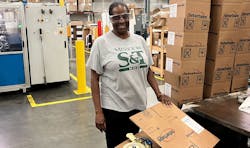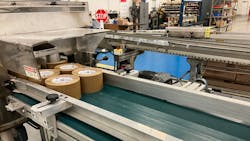2023 IndustryWeek Best Plants: Voice of the Employee Delivers Excellence at Intertape Polymer Group
It’s a late-July morning, and the workforce at Intertape Polymer Group’s Carbondale plant has a full plate. The 9:30 a.m. gemba walk is about to get underway; members of the leadership team and machine operators are gathering at critical equipment to discuss challenges to production and either resolve them or elevate them for further review. It’s the first of two gemba walks each day.
Elsewhere in the plant, a group of employees is huddled together in deep concentration at a sprawling production line. They are participating in a weeklong kaizen to reduce changeover time, a primary cause of downtime in this facility. The goal with this event is to reduce changeover time by 40% in one area of the line. Currently the changeover takes 54 minutes and encompasses 103 steps.
And outside, adjacent to the plant, repairs are underway to IPG’s large solvent recovery system, which recently was struck by lightning. The timing of such an event is never ideal, but it’s particularly aggravating when it happens just as the team is wrapping up a rehab project on said system. Still, once past the shock, it’s back to work to get things right.
Intertape Polymer Group
Carbondale, Illinois
Employees: 151, (union)
Total Square Footage: 200,000
Primary Product: Pressure Sensitive Tape
Start-up Date: 1995
Achievements: 6 Energy Star Awards; 63% percentage reduction in customer reject rate within past 3 years; Intertape Polymer Corp. recognized the Carbondale site with the “Quality Cup” for its outstanding quality performance in 2020, 2021 and 2022; 80% of production workforce participate in empowered or self-directed teams; 47% reduction in plant's total OSHA recordable injury and illness cases over the past 3 years; kaizen/SMED events have resulted in 45% reductions in changeovers on various machines; Intertape Polymer Group recognized the Carbondale site with the "Best Plant Sustainability Program" award in 2021.
While the Carbondale plant could not have anticipated the lightning strike, one could say it’s ideally suited to deal with the unexpected. It’s agile by nature. The Carbondale site is a specialty plant for industrial tapes, meaning that it houses a host of flexible manufacturing processes to produce tapes that may be bound for unusual environments or with demanding requirements. (think electrical transformers, subsea oil applications and even the tape on your favorite golfer’s club grips) In fact, in the Intertape Polymer Group universe of facilities, most of the specialty tapes made at the Carbondale site are made only at the Carbondale site.
Secondly, the leadership team has made concerted efforts to build a workforce of engaged workers with a problem-solving mindset. Evidence of its success in that endeavor includes substantial reductions in changeover times across multiple machines, double-digit reductions in OSHA injury and illness rates, reduced reject rates and repeat quality awards within IPG. Recently the plant took on production of a tape that had proved challenging elsewhere and had it up and running within seven days.
“We are nimble at what we do because we have to have to be,” says Lowell Hall, senior project manager.
Built on a Solid Foundation
An engaged, problem-solving culture doesn’t develop without nurturing and ongoing support. It requires a solid foundation. At IPG facilities across the globe and in Carbondale, that solid foundation is the Intertape Performance System. It underpins the manufacturer’s drive for excellence in areas such as quality, safety and productivity. It’s a framework for continuous improvement and encourages idea-sharing.
At Carbondale, the framework translates to visual communication boards on the production floor, and:
- An annual kaizen roadmap that outlines priorities
- Problem-solving teams
- Active quality and safety teams
- The training and tools necessary for employees to actively participate in the improvement process
The gemba walks are also key, suggests Quality Manager Tim Knapp. Leadership introduced gemba walks in the coating department (one of two primary production departments; converting is the other) in 2018 and expanded them across the facility the following year. These daily interactions—meant to generate discussion and idea-sharing, not place blame—are led by shop-floor employees.
“When I really look at the culture here, gemba walks have brought about much more problem-solving,” says Knapp.
This continuous improvement mindset occurs in a union environment. Shop-floor workers at IPG Carbondale are represented by Laborers’ International Union of North America, Local 733. And while union-management relationships can be fraught, that’s not the environment here. Both sides of the equation suggest the opposite is true.
“Excellent” is how union steward Dan Zimmerman describes the relationship. Zimmerman has worked at Intertape for more than six years, and he’s been a union steward for nearly four. He credits both the local union representative and Aaron Christ, IPG’s operations manager, for helping steer a positive relationship. Of Christ, Zimmerman says, “he’s really good at working stuff out” before it becomes a big problem.
For his part, Christ describes communication between labor and management as “incredibly open.”
Moreover, the IPG’s site demonstrates that unionized plants and continuous improvement can mix successfully. Zimmerman, who earlier this year participated in a kaizen event and has engaged in other improvement efforts, states what seems obvious when he says, “Why wouldn’t we want to participate in making our work better?”
Creative Hiring Strategies
Evidence of IPG Carbondale’s nimble nature and problem-solving skills extend well beyond its continuous improvement efforts. Consider the plant’s response to workforce challenges brought on by the COVID-19 pandemic, for example. As with many manufacturers during that time, IPG Carbondale faced hiring challenges and unstable workforce numbers.
The facility’s answer to the dilemma was to get creative – and also provide a helping hand to people facing barriers to employment. In short, Intertape tapped a talent pool others might shy away from: previously incarcerated individuals (non-violent offenders) transitioning back into the community.
It proved to be a good decision. The hiring solution, created in partnership with area workforce development organization Man-Tra-Con Corp., “provided opportunities for individuals that needed a 1st, 2nd or 3rd chance, while allowing the Carbondale to avoid operation disruptions resulting from workforce availability,” according to IPG Carbondale. Elements of the solution included training assistance and grant dollars to defray early expenses.
Moreover, the collaboration with Man-Tra-Con provided benefits to IPG Carbondale’s in other ways. “What we noticed with Man-Tra-Con is they have a lot of touchpoints [with the community they serve], and we’ve identified that as a good practice,” says Human Resource Manager Christina Fisher.
As a result, IPG’s leadership team boosted its own already robust engagement tools, be it via lunches with the leadership team, increased feedback for new hires, greater visual management and other elements.
Approximately 10% of Carbondale’s workforce comprises employees who joined the company via the Man-Tra-Con partnership. Individuals who Christ says once may have been considered a problem, “now are able to be one of the problem-solvers.”
Carbondale Goes Hollywood
With its strong focus on workforce initiatives, IPG Carbondale recently turned its creative talents to video. The goal: to increase awareness of southern Illinois as a good place to work and live, and, by extension, increase the pool of IPG workforce candidates.
IPG Carbondale already pursues several paths to get its name out in the community. It has forged strong links with local educational institutes like Southern Illinois University, whose roots in Carbondale date to 1874. Not only does the facility provide internships and extern opportunities, but it also gives plant tours to illuminate potential manufacturing careers, and its members make classroom presentations. IPG is also a regular presence at home SIU football games, where it hosts a tailgate for employees and their families.
Still, recruiting outside the confines of southern Illinois can be a challenge. Chicago may be a known quantity to potential employees located outside the state, but Carbondale and southern Illinois, less so.
To help remedy that lack of knowledge, IPG teamed up with an agency to develop a series of professionally produced videos that highlight the many things to do in the area once you step outside the walls of IPG. The first video aims to capture the attention of people for whom outdoor activities is a compelling draw, given that Carbondale IPG is located just minutes away from the Shawnee National Forest. The video shows a would-be Intertape employee (in this case, an actor) busy at the plant performing his duties, with actual Intertape employees appearing in the background. As the workday concludes, the lead character virtually exits the facility and is immediately transported to his happy place outdoors, outfitted in hunting gear and a smile.
Christ got the idea to bring the magic of video to IPG after watching a video created for the regional economic development hub, SINow. He even engaged the same producer.
It’s too soon to measure whether this new recruiting tool will reap rewards for Intertape. However, it’s yet another demonstration of IPG seeing a problem and, hopefully, solving a problem.
“Everybody is a problem-solver here,” Fisher says. “That’s what makes a dynamic team.”
It’s Still About People
And, finally, you can’t talk manufacturing without talking technology. The Carbondale site is early in its digital transformation and automation strategy. It is actively implementing technologies to increase its ability to capture data from its machines and then analyze that data to improve plant operations. Similarly, automation aims both to further develop plant flexibility and free up human workers for more value-added activities.
Make no mistake, however. More data delivered by technology does not translate to less need for active management participation on the plant floor. The leadership team still gets its best data from those twice-daily gemba walks.
“The voice of the employee is always going to be important,” Christ says.
About the Author
Jill Jusko
Bio: Jill Jusko is executive editor for IndustryWeek. She has been writing about manufacturing operations leadership for more than 20 years. Her coverage spotlights companies that are in pursuit of world-class results in quality, productivity, cost and other benchmarks by implementing the latest continuous improvement and lean/Six-Sigma strategies. Jill also coordinates IndustryWeek’s Best Plants Awards Program, which annually salutes the leading manufacturing facilities in North America.
Have a story idea? Send it to [email protected].


